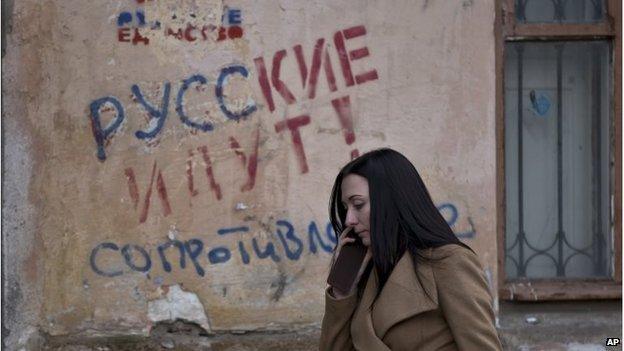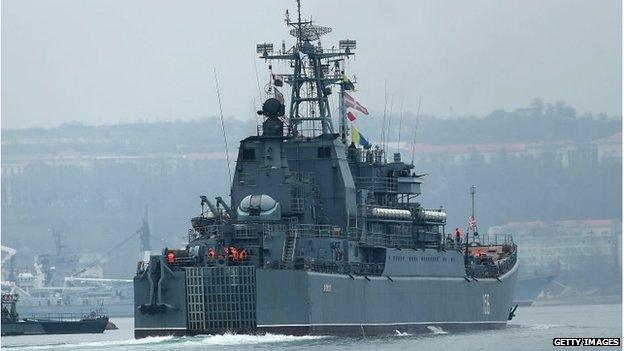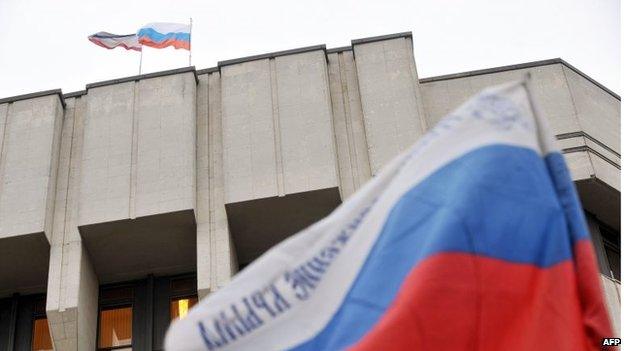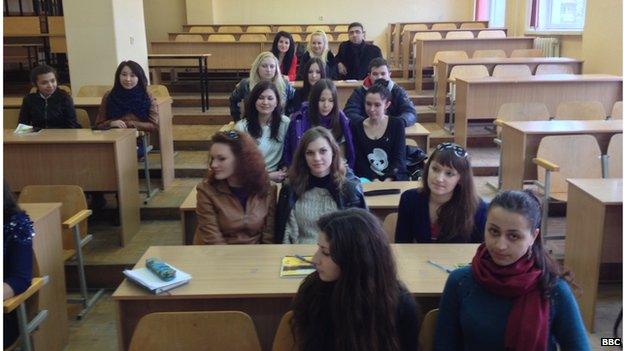Crimeans' loyalties split despite leaders' certainties
- Published

"The Russians are coming - Resistance" reads the graffiti, in Simferopol, Crimea
Outside Crimea's parliament, the leaving party for Ukraine - and the welcome celebration for Russia - had begun.
Crowds of people waved flags and sang Russian pop songs, delighted that, as far as their newly-installed regional government was concerned, they now live in the Russian Federation.
The law was rushed through the autonomous province's parliament, with 79 of 81 MPs backing the proposal to leave Ukraine.
There is, of course, the small matter of the region's referendum on that same question, now brought forward to 16 March.
Crimea's First Deputy Prime Minister Rustam Temirgaliev told me he was certain of victory.
"Ukrainians will become Russian citizens here", he said. "We will win this vote with 70 or 75%. The referendum is legitimate."
But Kiev begs to differ. The new Ukrainian Prime Minister, Arseniy Yatsenyuk, has called the move "illegitimate and with no legal basis", as Ukraine's constitution states that any change to its borders must be approved by the whole country.
A war of words has begun between Kiev and Crimea, with the autonomous government insisting that it was the revolution in Kiev that was unlawful and that only the Crimean parliament represents the will of the people.

Once guests of the Ukrainian government, now the Russian navy is blockading their local counterparts

Crimea's parliament has become a focal point for supporters of its turn to the east
'Threat to identity'
But how justified is the confidence of the Crimean authorities that people here want to change country?
At demonstrations like the one outside the parliament, there is a clear nationalist fervour. "We want to go to Russia", says one student "not the European Union. Russians are our sisters and brothers - and this is a great idea."
It is a widely-held view among the ethnic Russian majority here, who have staged daily pro-Russia protests against what they call the "fascists and nationalists" who have taken power in Kiev. Many Ukrainian Russians feel threatened by the revolution, fearful that Ukraine's new westward trajectory threatens their language and identity.
But in over a week of reporting from Crimea, I've spoken to countless Russians who feel differently - favouring greater autonomy within Ukraine, rather than wanting to switch country.
Among them are Lena and her family - ethnic Russians who welcome me to their apartment in Simferopol, their one-year-old son plays at our feet. They are determined he should grow up a Ukrainian citizen.
"I feel sad and disappointed by this move", Lena says. "Crimea is my homeland. I would not be happy to live in Russia - it's a foreign country for me."
Her husband Dima would also vote no in the referendum. But, he tells me, the problem is that Crimea is still searching for its identity. "I'm Russian but not a citizen of the Russian federation. We are different people," he says. "I want to feel Crimean, but even when I type it on my computer, my spellchecker underlines it like it's not the right word."
Crimean Russians are split, perhaps by generation. Lena's mother, Irina, remembers 1954, when Crimea was given to Ukraine by the former Soviet leader Khrushchev in a move that many here still resent. "I would vote yes in a referendum", she says. "Crimea has always been a Russian land and I don't have any emotional bonds with Ukraine."
Aside from the Russians, there is a sizeable community of ethnic Ukrainians and Crimean Tatars, who together make up around 40% of the population. They would both certainly reject changing nationality.
The Tatars were deported by Stalin to Central Asia in 1944, as punishment for alleged collaboration with the Nazis by some. Many died, and even after some eventually returned, they remained fiercely anti-Russian.
And that is the problem here. Within this small, rugged peninsula, the divisions are so deep that nothing can satisfy everyone.

The divide in Crimea, as elsewhere in Ukraine, is as much generational as regional
Gauntlet thrown down
For those who have only ever known an independent, united Ukraine, I found widespread opposition to a territorial break-up.
At Crimea's technical college in Simferopol, the English class has 19 students, all born after 1991, when Ukrainians voted to break away from a crumbling Soviet Union - albeit with only a slim majority in Crimea. Every single student said they wanted the province to remain as part of Ukraine and simply longed for peace.
"I was born in Ukraine, I feel Ukrainian, and I will die in Ukraine," says one. "What's happening here isn't normal. I don't want Russian troops in my country."
But it is hard to get an accurate picture of overall support for separation - or annexation - by Moscow. Crimeans have little faith in opinion polls, and with Kiev and western governments announcing the referendum won't be legal or recognised, it's not even certain to go ahead.
Crimea has thrown down the gauntlet to the Ukrainian government. The territorial integrity of the country is under threat - and Europe's borders could yet be redrawn in this disputed corner.